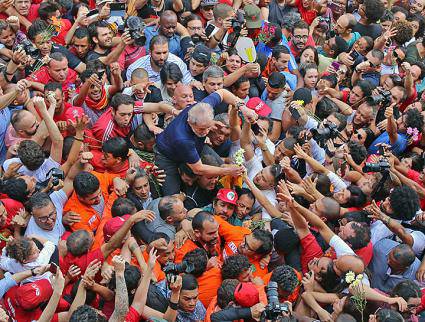Brazil’s coupmakers want to jail democracy | Golpistas querem prender a Democracia
reports on the mobilization to protest the jailing of Brazil’s former president–and what this latest action signals about the right wing’s escalation.

AFTER SPEAKING for nearly an hour in an exhausted, raspy voice to tens of thousands of supporters assembled outside the Metal Workers union headquarters in Sao Bernardo De Campo, former Brazilian President Luis Inácio Lula da Silva turned himself over to authorities.
In his speech, Lula proclaimed his innocence, condemned the trumped-up charges that will send him to prison for 12 years and prevent him for running in this fall’s presidential elections, and saluted the historic organizations of the workers’ movement.
“Lula will not hide, I will prove my innocence!” he declared to loud applause outside of the headquarters of the union where he began as an organizer decades ago. “I will comply with the order. I’m not above the law. If I didn’t believe in the law, I wouldn’t have started a political party. I would have started a revolution.”
Standing next to him on the podium as he spoke to the crowd were: fellow Workers Party (PT, by its initials in Portuguese) leader Dilma Rousseff, Lula’s successor, who was impeached in August over corruption charges; leaders of the Unified Workers Union (CUT) and Communist Party of Brazil; and Guilherme Boulos, leader of the Movement for People without Homes (MTST), who is also the presidential candidate for the Party for Socialism and Freedom (PSOL).
Lula thanked them all for their defense of democratic liberties, and kissed Boulos, saying “Guilherme Boulos is a friend who is a candidate to be president of the republic. A friend who has all the qualities that you want.”
When he finished speaking, thousands chanted in unison “I am Lula!, I am Lula!” as he was hoisted onto a supporter’s shoulders to push through the densely packed crowd, shaking hands on his way to surrender to waiting federal police.
The crowd blocked Lula’s first attempt to leave the building on the afternoon of April 7–with people pushing back as the gates were opened for his car to exit.
What might have been possible had Lula refused to surrender is hard to say. Thousands of people, especially young people–many of whom were mobilized by the MTST–occupied the streets for hours, chanting “Surround him, don’t let them take him!” while blocking police from getting to Lula.
Eventually, Gleisi Hoffmann, the former chief of staff to Rousseff and current head of the Workers Party, was forced to beg the crowd to allow Lula to leave. PT officials found a way for Lula to exit away from the crowd, and he turned himself in.
– – – – – – – – – – – – – – – –
“BRAZIL’S FIRST working class president,” as the New York Times called him, served two terms as president, from 2003 to 2011, with a program that centered on fighting inequality.
Lula’s conviction, as well as Rousseff’s impeachment, are a result of an anti-corruption investigation spear-headed by Judge Sergio Moro resulting from Brazil’s hosting of soccer’s FIFA Confederations Cup in 2013. Moro’s investigation explicitly targeted the left, in particular the PT, which had held control of the presidency for 14 years. As SocialistWorker.org wrote last year:
Rousseff was impeached over what amounted to accounting gimmicks to make her proposed national budget look better than it was.
With the PT out of power, Moro turned his attention to destroying Lula, who remained immensely popular, by trying to prove that the ex-president had personally enriched himself.
In the end, while Lula certainly did much better for himself than the majority of his working-class supporters, the prosecution’s case rested on flimsy evidence centering around Lula’s alleged ownership of a luxury apartment valued at $691,000. By way of comparison, Eduardo Cunha, ex-president of the Chamber of Deputies of Brazil and a conservative leader in the campaign to unseat Rousseff, was charged with taking $40 million in bribes.
Lula’s conviction may be the country’s ruling elite exacting revenge for having to tolerate a decade and a half of PT rule. But there is clear evidence that the Workers Party, under both Lula and Rousseff, followed the example of Brazil’s traditional parties in channeling huge sums of money from private corporations into campaign coffers.
With the PT’s image tarnished, the mass working-class support that protected Lula and his party from previous ruling class maneuvers peeled away. The right wing was ready to take advantage–it gained the presidency through impeaching Rousseff and now rules Brazil.
Under Brazilian law, a candidate is forbidden from running for office for eight years after being found guilty of a crime–so the stage was set for a showdown when Lula announced his intention to run in the upcoming presidential election in October.
– – – – – – – – – – – – – – – –
WHILE SOME hoped for Lula and the PT to call for more than symbolic resistance to his being taken into custody, Lula’s decision to give himself up marks the beginning of what will be an arduous campaign for his freedom and restoration of political rights.
No doubt Lula and the PT leadership calculated that surrendering voluntarily would avoid a confrontation they feel they cannot win in the short term. But it may only encourage the Brazilian right to intensify a political offensive that began with the Rousseff’s 2016 impeachment and has escalated recently.
The right now controls the presidency–in the person of Rousseff’s successor, Michel Temer–and both houses of Brazil’s Congress. The conservatives have weathered enormous protests in recent months and gone on the attack with a series of police and military operations, including sending the army into the streets of Rio de Janeiro and the March assassination of PSOL city councilor Marielle Franco.
For now, the right has the upper hand, raising the frightening prospect of an election victory for Jair Bolsonaro, Brazil’s version of Donald Trump and one of the leading contenders for the presidency at this point in the campaign.
If anything, Bolsonaro is further to the right than Trump. He openly praised Brazil’s 20-year-long military dictatorship that ended in 1985, and he was recently fined for stating that a left-wing member of Brazil’s congress was not “worth raping; she is very ugly.”
Even if Bolsonaro loses to a more “moderate” conservative, the danger of the far right is clearly growing.
– – – – – – – – – – – – – – – –
ALTHOUGH TENS of thousands took to the streets to protest Lula’s incarceration, his imprisonment points to the gap between the historic aspirations of the PT and its current diminished fighting power, raising a question for the entire Brazilian left about how to proceed.
Immediately after Lula’s surrender, Valerio Arcary, a former member of the PT’s national executive and now a leader in the Movement for an Independent and Socialist Alternative (MAIS) current inside PSOL, and Silvia Ferraro, a member of the PSOL National Executive, spoke, explaining the stakes involved for the left and the working class.
As Ferraro stated:
I have no illusions in Lula. These ended right after 1989, when the PT made a deal [with centrist political forces] to try to win the elections and no longer fight for power. But today, I am in the ranks of those who are certain that it is not possible to overcome anything on the left without defeating the right.
Today, I’m in São Bernardo, not to put hope in the project [pursued by the PT leadership], but to defeat [Lula’s prosecutor] Sérgio Moro, to defeat the coup. The paths of the reorganization of the left will only open with the defeat of the bourgeois reaction.
Those who have taken Lula, those who are organizing this coup, in reality want to imprison all of us, our resistance. They want to launch even more attacks on the working class. Therefore, starting today, we must reinforce our resistance and, first of all, take to the streets to defend our rights and freedom for former president Lula.
Our resistance is not over. Our resistance is going to continue, in the factories, in the schools, in the streets, in our neighborhoods. Our working class will fight–the same working class that brought down the military dictatorship in the early 1980s and is fighting today against this new coup.
Arcary ended his contribution with this:
It’s obvious that Lula’s incarceration will impact the consciousness of millions of people. We know that in this country, the socialist left represents the interests of the workers, of the exploited and oppressed, of the women, the youth, LGBT people, the people who live in the favelas, those who have no access to quality education. We are the majority. We will always be the majority, and we will win.
Por
Fonte: Socialist Worker
